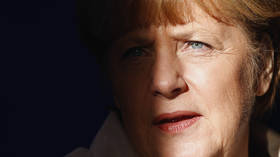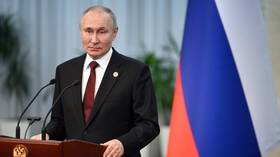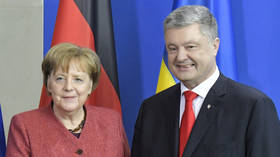Fyodor Lukyanov: How can we explain Angela Merkel’s bombshell revelations about the Ukraine peace deal?
Long the dominant politician in Western Europe, the ex-CDU leader may be taking some artistic license to suit the prevailing mood of today
By Fyodor Lukyanov, the editor-in-chief of Russia in Global Affairs, chairman of the Presidium of the Council on Foreign and Defense Policy, and research director of the Valdai International Discussion Club.

Former German Chancellor Angela Merkel's remarks in an interview with the newspaper Die Zeit have caused a stir among commentators: “The 2014 Minsk agreements were an attempt to give Ukraine time,” she admitted. “And it used that time to become stronger, as you can see today. Ukraine of 2014/2015 is not the Ukraine of today.”
Thus, Frau Merkel confirmed the words of Ukrainian officials, above all those of ex-President Pyotr Poroshenko, that Kiev was never going to implement the peace deal, but was just playing games.
The former long-serving head of the German government was not forced to make such a declaration. So we have every right to interpret her remarks literally – that is, as an admission of deceit, or rather of conscious deception. This backs up what Moscow has been saying for a long time – that Ukraine was just pretending to engage in the peace process but was actually preparing for revenge, while the Western countries (Germany and France as direct participants and the US as an indirect curator) were assisting this duplicity.
We would venture to guess that this is a greatly simplified interpretation and that the reality was somewhat different. In some ways, though, it is worse, because consciously chosen behavior is easier to understand than the more chaotic alternative. It’s reasonable to suspect that Merkel had no special ulterior motive either when the peace deals were signed or when they were not implemented. In both cases, Berlin and Paris sincerely believed that they were working hard for peace and security in Europe.
The Minsk agreements, which managed to be put into effect on the second try, were the result of Ukraine's military defeats, meaning the task of its Western backers was therefore to stop the fighting by any means necessary. In some quarters at the time it was said that Merkel had actually advised Poroshenko not to sign the proposed document because she understood that the terms enshrined therein were beneficial to Moscow. The idea that the special conditions for the return of Donbass to Ukraine spelled out in Minsk would allow Russia to have a kind of “stop valve” to block further geopolitical moves by Kiev suited the Russian side.
The Kremlin did appear to believe this was possible, although there were also opponents of the approach. The Ukrainian side was guided by its traditional political culture, which believes there is no such thing as a final agreement. So what difference does it make – i.e. we will sign now and then we will see.
Was there some sort of cunning plan conjured by Berlin (Paris, then represented by François Hollande, should not be considered separately – the French president was acting as a sidekick of Merkel at the time)? Hardly. Rather, there were two instincts at work.
The first was that Ukraine was a priori in the right and Russia was in the wrong, whereas the specific circumstances were unimportant. The second was to find a way to brush it all under the rug so that there would be no need to constantly worry about how to resolve the issue and be distracted by a subject that was, in general, secondary to the broader European politics of the time.
The latter method did not work, as we can see now. In reality, things worked out along the lines of what Merkel is saying now: The Minsk agreements bought time to rearm Ukraine and prepare it for war with Russia. But to assume that this was the original intention is to embellish the strategic talents of the Western Europeans.
Of course, if the Minsk agreements had been seen by the participants as a serious tool to achieve certain goals (albeit ones different from what they are now saying), perhaps they would have played a useful role. However, because all sides had an actual agenda in addition to the one being proclaimed, the process really did become a smokescreen for something entirely different.
Paradoxically, the loser was the one with the smallest gap between its two agendas. Russia's declared and true objectives differed less from each other than was the case for the others. And Moscow did push for Minsk to be implemented as close to the letter of the agreements as possible, whereas the others – from what Merkel said – saw them at the very least as nothing more than a way to buy time.
Why Angela Merkel is now saying such things is clear. In the current Western frame of reference, diplomacy with Putin, even retrospectively and with seemingly good intentions, is considered criminal collusion. Frank-Walter Steinmeier, who since the days of Gerhard Schröder’s chancellorship had invested a lot in “rapprochement through mutual dependence,” has simply apologized: saying he was wrong and sorry.
Merkel, however, is looking for rational excuses, or rather making them up, by reshaping the situation as it was back then to suit the present one. But she is doing it in such a way that actually supports what Putin has been pointing out: How can we negotiate at all then? But that is already of no interest to anyone.
The Minsk agreements are a thing of the past because they brought to a close one phase of the conflict, whereas now another, qualitatively different, one is raging. It is very difficult to imagine that it will end with something similar to the negotiations of 2014-2015. Indeed, so far, it is not at all clear what is even meant when there is talk about negotiations. Negotiate about what? All sides in the standoff have already declared it existential – so what compromises can there be? Nevertheless, it is useful to remember the political lessons of the Minsk agreements, and not at a later date, but now.
This article was first published by Profile.ru



0 Comments:
Post a Comment
Subscribe to Post Comments [Atom]
<< Home